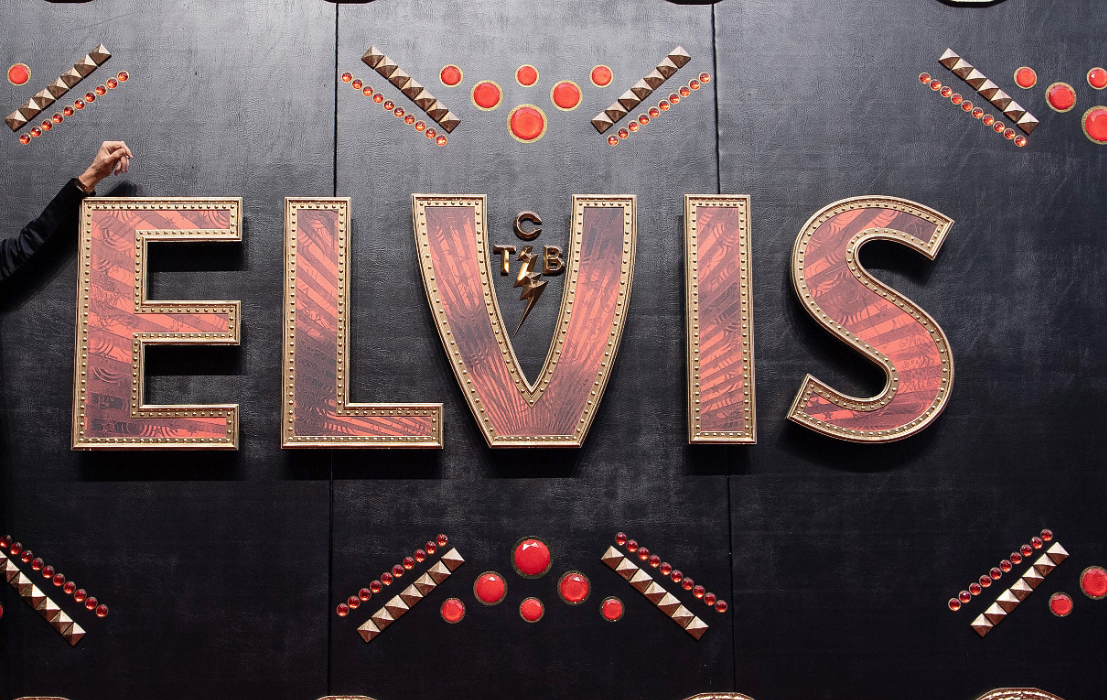More of the King
Baz Luhrmann’s Elvis is a barrage of brilliantly produced images and songs that evoke Presley’s talent as a musician and a showman.

Elvis Presley's life was defined by a very American set of contrasts. He was a fervent Protestant whose on-stage gyrations practically violated the Ten Commandments. He boosted Nixon's War on Drugs and struggled with drug abuse. He was born in abject poverty and became one of the world's most famous men. He lived to make music, and his tour schedule killed him.
His music represented a cross-section of American culture. Elvis's oeuvre spans every genre of 20th-century American music with the possible exception of jazz. He broke out with rockabilly hits like "Blue Moon" and reimagined country classics like "Your Cheatin' Heart"; his rock numbers, from "Jailhouse Rock" to "Hound Dog," were genre-defining. Elvis sang some of the century's most moving pop ballads, from "Always On My Mind" to "Hurt." His 30-track Gospel album is a favorite of the Pope's.
Elvis Presley CDs were the soundtrack of my childhood. I was born to an Elvis fanatic of a mother and a pair of maternal grandparents who insisted that we take a family trip out to Presley's Graceland mansion. I went to see Baz Luhrmann's Elvis in theaters the night it was released.
Elvis follows Presley, played by Austin Butler, from his childhood in a Mississippi shotgun house through his grueling final days. The nearly three-hour flick is narrated by Elvis's manager, Colonel Tom Parker, an illegal migrant from the Netherlands played by a fat-suited and thick-accented Tom Hanks.
Parker, born Andreas Cornelis van Kuijk, ingratiated himself with Elvis when Presley was a rising star at Sun Studio in Memphis. Hanks's Parker narrates the story of Elvis's career, from the controversial Southern concerts of the 1950s to his foray into Hollywood, the 1968 Comeback Special, and the world-beating concert series at Las Vegas's International Hotel through his death in 1977.
The film captures the tension between Presley's provocative, almost obscene on-stage persona and his conservative Pentecostal roots. On stage, Butler's Elvis dips, swoops, and thrusts his groin as women in the audience gasp and helplessly scream. The religious authorities are aghast. Off stage, Butler's Elvis says he likes most to perform Gospel music, saying that it brings him back to his roots.
Elvis highlights other contrasts in Presley's life. His eight-year run of insipid Hollywood musicals casts Presley as something of a climber; his performance of "Unchained Melody" at the film's conclusion, too weak to lift the microphone, is a portrait of an artist who has finally found himself.
Luhrmann emphasizes the influence of black music on Elvis's career, showing scenes of Presley interacting with Little Richard, B.B. King, and other black contemporaries. Modern critics claim that Elvis "took" parts of black culture and music and sold them to a white audience that was too bigoted to appreciate the same sounds and songs from black artists. To be sure, Elvis was inspired by black artists. His early music, particularly songs like "That's All Right," "Hound Dog," and "Mystery Train," blended a traditional country sound with soulful elements from black hymns and black blues artists.
Several times in the film, black artists are depicted singing a song moments before Presley sings the same song on stage. The implication is that Elvis was, to an extent, laundering music and styles that were not his to use.
Each of these moments in the film is shoehorned in; Luhrmann wants to placate progressive critics by hinting at Presley's "appropriation" of black music without casting Elvis as an out-and-out villain. Butler's Presley is humble and good-natured, so the "appropriation" doesn't seem malicious. The effect of this trope is nevertheless to discount Elvis Presley's generational talent.
Austin Butler delivers an impressive performance. He captures the King's boyish charm and command of the stage, his facial expressions and patterns of speech, the stop-and-go smile and the gravely Southern baritone. Butler's on-stage persona reflects Elvis's sex appeal and good-old-boy charm, the two features that have captivated American audiences for decades.
The director Luhrmann's artist chops, on display in The Great Gatsby and Moulin Rouge, carry over to Elvis. Each scene is rendered in brilliant color, contributing to the overall sensory experience of the film. Elvis die-hards will appreciate Luhrmann's attention to detail—the beads of sweat that populate Butler's tan and flush face in the middle of a number, the bejeweled jumpsuits with matching scarves, and the kitschy elegance of Graceland. Between its meticulous period-specific costuming, rich color palette, and foot-tapping musical numbers, viewers get a small taste of the electrifying experience of seeing Elvis Presley perform in person.
Subscribe Today
Get daily emails in your inbox
The movie suffers most from its emphasis on Tom Hanks's character. His attempt at a Dutch accent is grating. It does not sound like the actual Colonel Parker, who had something of a lisp but nothing like the cartoonish voice Hanks used in the role. His weird cadence and word choice, which sounds like a Disney villain—"Some peeh-pull say that I am the vee-lehn of this he-ah stoh-ree"—cheapens the human drama of Elvis's life. By the film's conclusion, the viewer wants more of the King of Rock and Roll and less of the obese con artist whose relentless prodding drove him to his grave.
Baz Luhrmann's Elvis is more a slideshow than a film, a barrage of brilliantly produced images and songs that evoke Presley's talent as a musician and a showman. You get more of Colonel Parker than you could ever want, and not enough of Elvis the man—the one who gave his friends Cadillacs, who made his home on the Tennessee hillside with a shooting range and a stable, and struggled to find the love he wanted more than anything. But there is enough Elvis, and enough of Butler's masterful performance, to justify a trip to the theater for this bio-pic of an American icon.
Comments